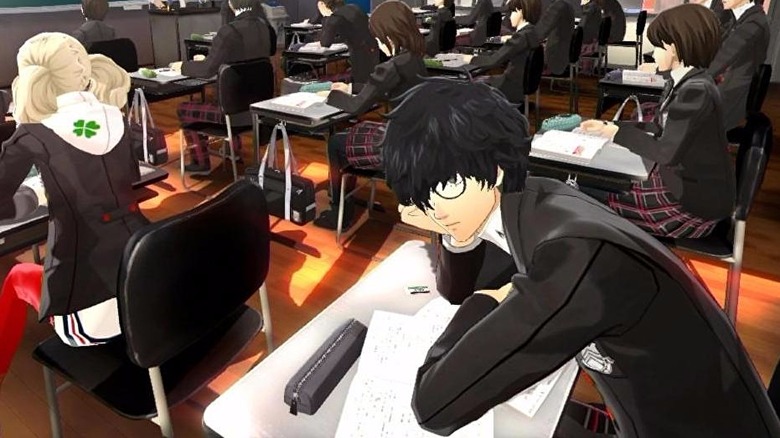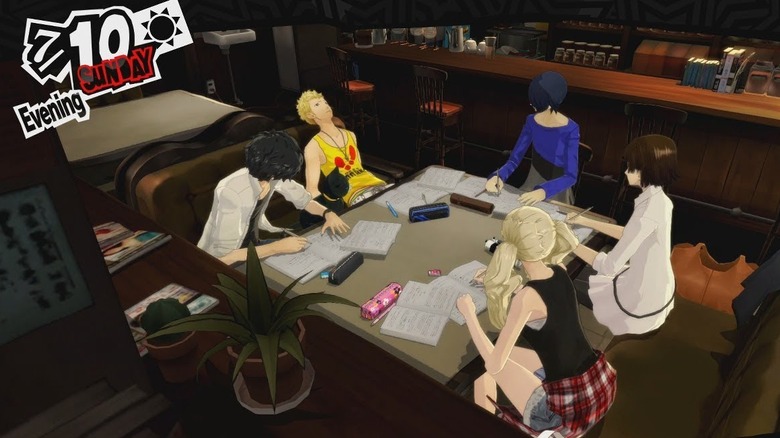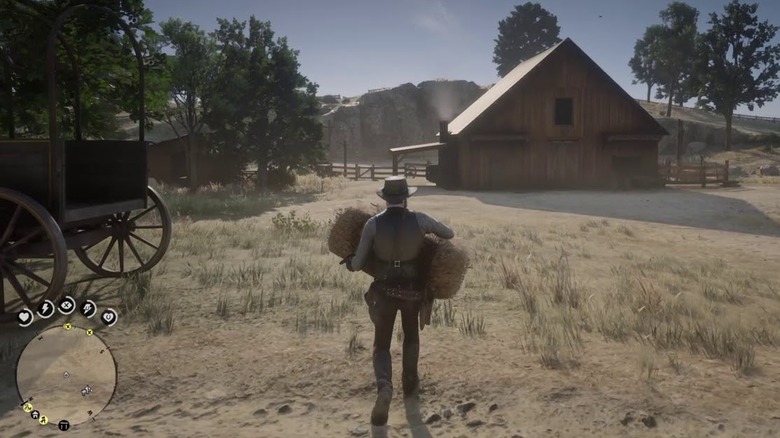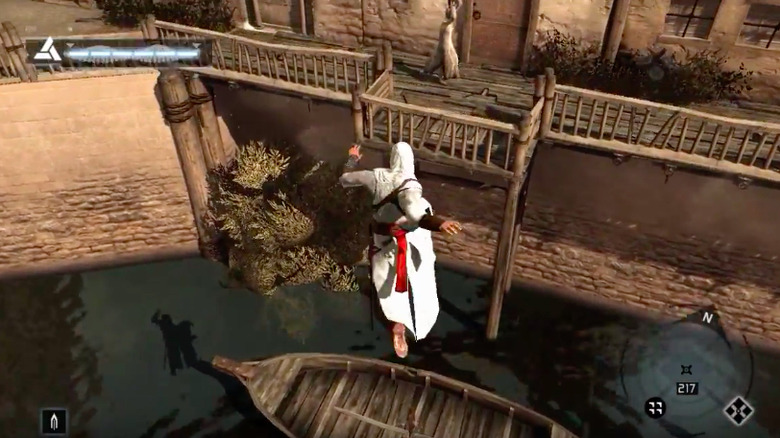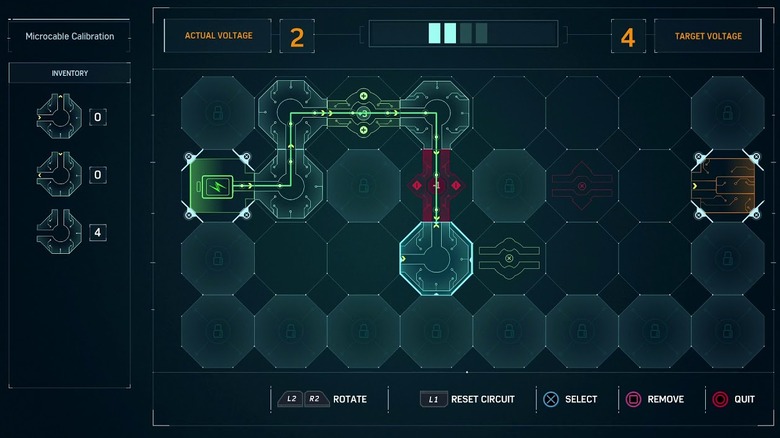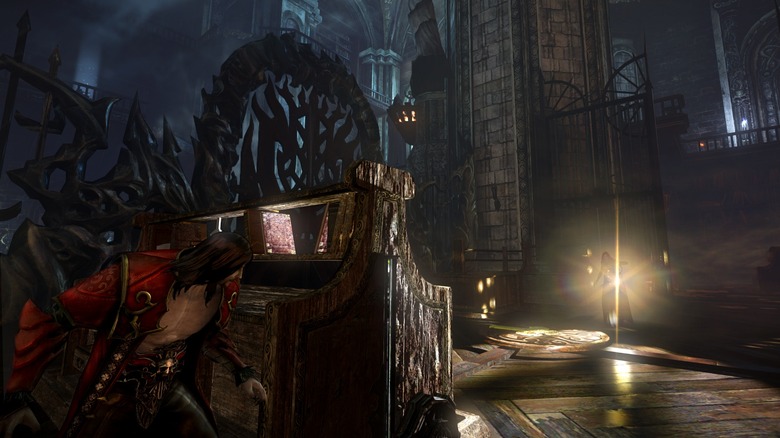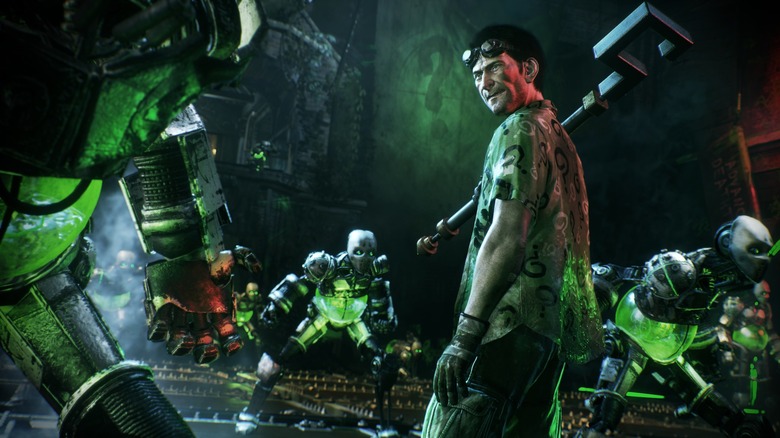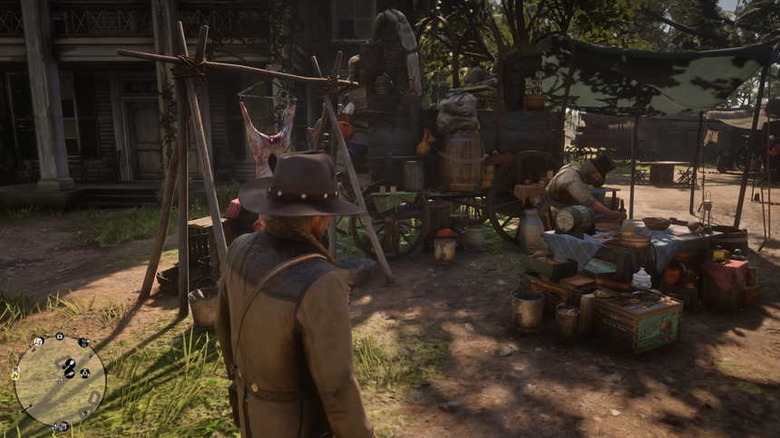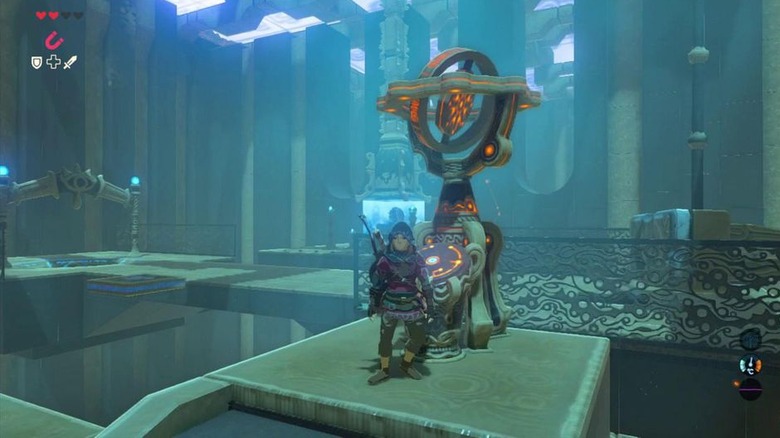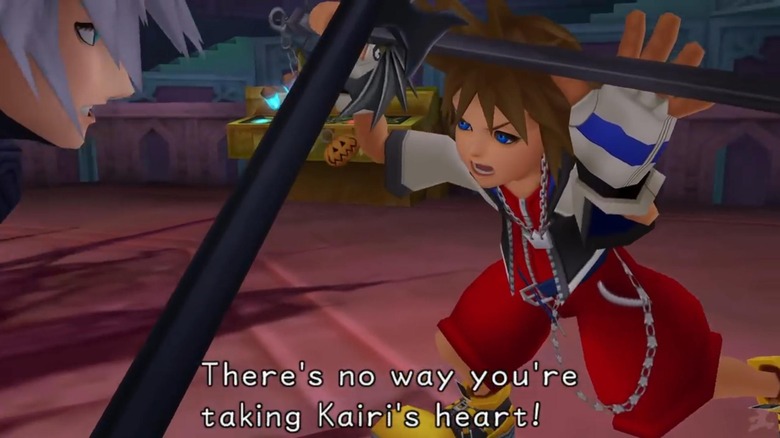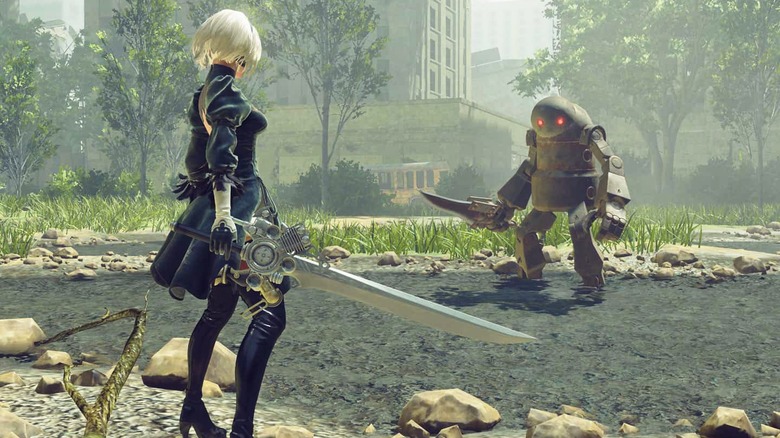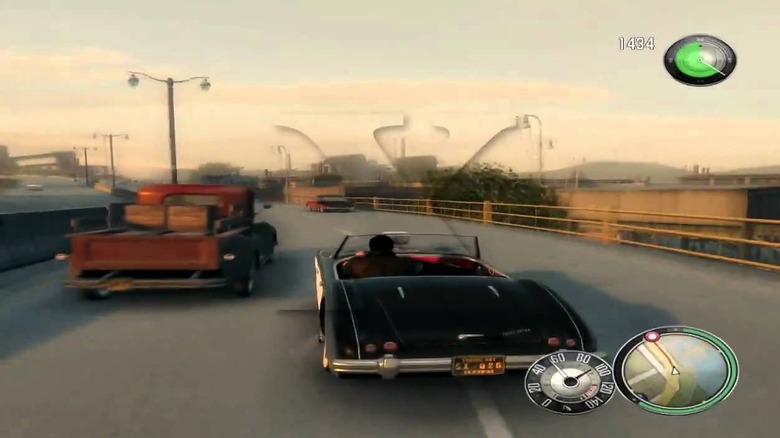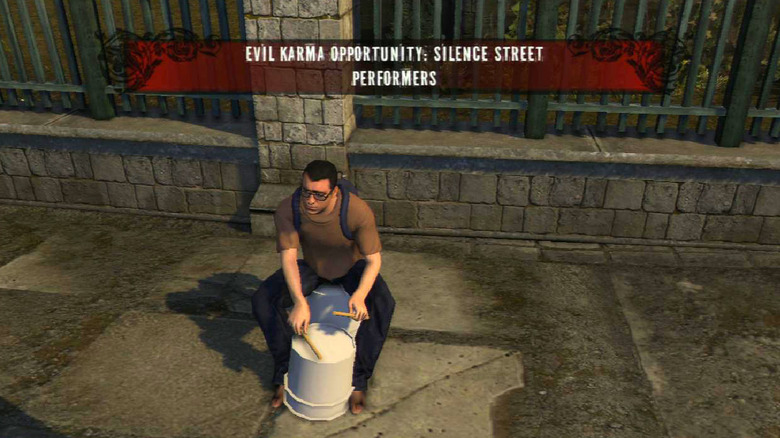The Dumbest Things Video Games Force Us To Do
Video games can be weird. That's part of the reason why we enjoy them. Whether they take place in magical kingdoms or futuristic dystopias, video game worlds have their own rules and physics to abide by. Sometimes, however, these rules are just silly. Even the best games will occasionally have gameplay mechanics that feel a little tedious or unnecessary. Sometimes, we will discover things in games that break our immersion in the story, making us wonder what the point even was.
What follows are examples of recurring oddities in video games, things that the medium plops in our laps time and time again to varying degrees of success. Some of these can be executed well (though rarely), while others feel like bizarre holdovers from an earlier time in gaming history. Video games can be weird, yes, but they are meant to challenge and entertain. However, they also tend to give us some really dumb things we have to take care of along the way.
Studying/taking exams
Video games are able to transport us far away from the real world and simulate fantastical things we could never have taken part in. Unless it's an educational game, one thing that they probably shouldn't do is take a break from an exciting fantasy story so that you can experience the anxiety of worrying about school. Take the Persona series, for example. A major recurring part of Persona 5 was making sure you made time to study for your exams in between all of the dungeon crawling and mystery solving. Then, the forward momentum of the game came to a halt for a few days of in-game time while the characters took their exams.
Likewise, Bully made taking classes a major part of the gameplay. There's immersion, and then there's just reminding us of how not fun school is. At least both the Persona series and Bully reward your character for doing well in school, but when you could be boxing with the jocks or invading the subconscious of a corrupt businessman, attending geography class may not be the most exciting part.
Doing your chores
Okay, so some games, like the Animal Crossing series, have turned the very act of the daily grind into a pleasant and adorable gaming experience. In other words, chores aren't always the worst. But when you're playing a mostly action-oriented game like, say, Red Dead Redemption 2, it's kind of a bummer when you have to take time out of your busy schedule of robbing trains and lassoing escaped convicts to slowly carry a bale of hay across a field. You're also occasionally forced to take a bath when your character gets to muddy out on the range, which just kind of puts off your ability to get back out on the hunt for a few minutes. Just let a cowboy be, ma'am.
Talking about moments like this in games like Red Dead Redemption 2 and Shenmue, Joe Veix of The Outline pointed out that it can feel like these games are "stalling for time, trying to juke the number of hours it takes to complete [them]." Look, we're not saying you should never take a bath. We're saying there's a very fine line between realism and tedium, a line which many games accidentally cross.
Avoiding water at all costs
Ah, water: the age old enemy of so many video game protagonists. Granted, video games have used "the element which brings life" as a way of providing a new challenge for players, like the swimming levels of the Super Mario games or the blasted Water Temple from Ocarina of Time. However, for some perplexing reason, many other games have forced players to avoid water like it might as well be quicksand.
The water was so deadly in Grand Theft Auto: Vice City that players have created mods to allow characters to swim or even walk on the water. Older games aren't the only ones with an aversion to water, however. Despite being a master assassin and one of the greatest superheroes of all time, respectively, Altair of Assassin's Creed and Batman in the Arkham series can't handle getting their feet wet. While Batman is able to grapple up and onto the nearest surface if he falls in, poor Altair drowns faster than you can say "high quality H2O." When a portly plumber is a better swimmer than the Dark Knight, a water hazard just feels silly and unnecessary by comparison.
Coding/hacking minigames
Imagine this: you're playing Warframe and your enemies have become aware of your presence. The only way to shut off the alarms is to hop on the nearest computer and hack into the ship's security. This is accomplished by essentially playing a minigame wherein you ... match up a few lines and shapes. Even fans that have been playing the game for years tend to find the mechanic to be pretty clumsy, with occasional awkward pauses following the solving of a puzzle.
The circuit board projects from Marvel's Spider-Man feel similarly silly, especially when taken at face value. They essentially turn coding and robotics into a match game. This is how Peter and Otto plan on changing the world? By making sure they match up all the correct shapes? Lockpicking in an RPG is one thing, but these kinds of puzzles tend to leave one to feel like these brief segments are little more than distractions. They're kind of a goofy roadblock, keeping you from getting to the next point of the mission, taking your attention away from the better-realized mechanics of these games.
Stealth segments in non-stealth games
Stealth missions can be exciting, particularly toward the end of a long journey, where everything depends on the hero not being caught. Where stealth mission tend to be a total misfire is when they pop up in a game that hasn't really encouraged this kind of careful gameplay, especially when said missions punish you brutally. Segments like this have killed games like Castlevania: Lords of Shadow 2, a game that allows you to brutally dispatch your enemies, but will punish you if you step on a dry leaf during one of these scenes. Despite LoS2's director's claims that the folks who didn't like the game were "blind or stupid," this isn't a problem unique to just this title. Many other high profile games have fallen victim to the inanity of the forced stealth mission.
Even a critical darling like Marvel's Spider-Man didn't escape these shenanigans, featuring multiple segments where players controlled either Mary Jane or Miles Morales in stealth missions that have been described as, "in short, boring and uninspired." Even if you didn't mind these stealth segments as much as other people, they're still odd hiccups in the otherwise strong pacing of these games' stories.
Collectathons for the true ending
Collectibles are ingrained in the very DNA of video games, so they're not always an annoyance. For instance, the Stars in Super Mario 64 are exciting to unlock, because they're the necessary keys to saving Princess Peach. The same can be said for the Gym Badges in the Pokémon games, which allow our characters continue their journeys. When the collectibles are integrated into the overall progression in a title, they just tend to work better.
The problem arises when they feel less like a goal and more like a drawn-out errand. For an earlier example, several of the Sonic the Hedgehog games won't show you their best endings unless you collect all of the Chaos Emeralds through those games' many bonus stages. Didn't get them all? Oh, well. Guess you'll have to try harder next time. Batman: Arkham Knight had a similar issue. While previous games had the Riddler puzzles as an optional quest, you'll have to collect a couple hundred little trophies if you want to see the game's true ending. It's another example of something that should be fun being forced on the player until it's no longer enjoyable.
Walk, walk, walk (but only in certain areas)
Red Dead Redemption 2 is an incredibly immersive game that puts you in the boots of a genuine outlaw, riding through the plains of the old west and getting into mischief. You can try to keep your activities hidden or rush in with your guns blazing. What you cannot do is run through a camp or settlement, because the game forces you to grind to a slow, trudging walk whenever you enter one. It's a bizarre choice that kind of snaps you out of the experience, especially if you wanted to make your visit to camp a brief one.
Another version of this phenomenon can be seen in the Pokémon games. Here, various authority figures will frequently force the protagonist to walk around in certain areas, rather than using their bicycles or running shoes. Sure, it makes sense that our characters probably shouldn't be racing around an office building on a ten speed. Still, many of the other instances of this forced walking simply break up the flow of the game, while also having the added effect of making Oak or whomever is admonishing the player look like a real creep.
Motion control in analog games
The Legend of Zelda: Breath of the Wild features several puzzle-filled Shrines. As Polygon points out, "Sometimes these puzzles rely on logic or Link's magical skill set. Others, unfortunately, require some very, very precise usage of the Joy-Con controllers' motion control capabilities." These puzzles can be so finicky that many players considered them to be the "one bum note" of an otherwise incredible game.
When motion controls are done well, they encourage a new level of physical focus from gamers. When they're clunky, especially in a game that doesn't normally utilize them otherwise, they can be a total drag, breaking up the flow of the game. There are literally moments in the horror game Until Dawn that simply require players to hold their controllers completely still. Somehow, it's very easy to fail these segments due to the controller's vibrations or by simply sitting in the wrong position when these events begin, sometimes resulting in the permanent deaths of your characters. Nothing can ruin a game like the feeling that you're being punished by an overly touchy system.
Watching unskippable cutscenes (again and again)
There's an entire generation of gamers who can still hear the words, "There's no way you're taking Kairi's heart!" in their sleep, and there's a very good reason for that. Unskippable cutscenes, particularly those preceding a major boss battle, are simply infuriating. They take a potentially affecting and dramatic sequence and shove it down the players' throat until it's completely impossible to care about. It's especially frustrating when these cutscenes play again after losing a fight, breaking up the flow of gameplay while you sit and yawn through the same "shocking" revelations and villainous taunts before you can just get on with it.
This is an annoyance that game developers have become aware of, with some even taking steps to alleviate the problem. For example, Bandai Namco released an update patch for their crossover fighter Jump Force that allowed players to skip the cutscenes. This was a bit of a blessing because, well, those cutscenes were looooonng (and kind of awful). The Final Mix release of the first Kingdom Hearts also blessedly added the option to skip cutscenes once they'd been seen for the first time, allowing players to just show Riku who's boss.
Locking the true ending behind a second playthrough
Requiring players to play through full game multiple times in order to "properly" conquer it is an example of something that TV Tropes calls "Fake Longevity," which is essentially a cheap way to extend gameplay time. The great grandpappy of this trope is Ghosts 'n' Goblins, the brutally difficult Capcom game that revealed your entire first playthrough was a trap from Satan himself (no, really). In order to truly defeat the game, you were required to play the game again in its entirety on a heightened difficulty.
Another, more recent example would be Nier Automata, a game which requires players to beat it multiple times, meeting different conditions and taking alternate routes to see the games many endings. It's, uh ... kind of excessive.
This is very much separate from New Game+, which oftentimes allows gamers to replay a game with all of their fun gear they've collected, as well as a higher difficulty level. The difference here is that it comes down to a choice of whether or not you want to keep playing. Otherwise, it's kind of wild that a game will force that kind of investment just to unlock some achievements or alternate cutscenes.
Racing segments in non-racing games
It's difficult to deny that one of the most divisive additions to the Batman: Arkham series was the use of the Batmobile in Batman: Arkham Knight. Escapist Magazine called it "a bad feature trapped in a good game, and it drags the entire experience down." That's sadly the problem with introducing vehicular elements to a title where they can feel somewhat out of step with the rest of the game.
Another infamous example of this would be the so-called "Race Car Level" in 2002's Mafia. While much of that game involves getting new vehicles to drive around New York City, there was one segment that had you race a car around a professional track that was so hard to control that many players got locked out of finishing the game. It was so bad that the sequel's producer acknowledged it as one of his criticisms of the original game. Racing games — and driving in games, in general — can be fun, but some games make it feel like such an afterthought that it detracts from the whole experience, especially when you have to complete a certain racing segment to proceed.
Impossibly simple moral choices
Here's a real head-scratcher: you've spent the last few dozen hours of Far Cry 3 fighting your way through dark jungles and dismantling a ring of drug-trafficking pirates run by a madman in a desperate bid to save all of your friends. Now that you're reunited, you're given a choice: get your friends home safely or murder all of them in cold blood. Do what now?
Or how about that moment in Batman: Arkham City, where Catwoman is given the option of leaving Batman to die, rather than finish the mission she's been helping him with through the entire game. Seems pretty counterintuitive, doesn't it?
Unfortunately, that's the kind of "complex" moral choice that so many games thrust upon players in the name of adding some sort of extra depth to their actions. Even games that bill themselves as being dependent on moral actions and consequences, like the inFamous series, fall victim to these silly kinds of choices. Take inFamous 2's options to kill innocent street performers for no reason. Of course one of those decisions will make you evil, so the illusion of having a difficult choice to make is little more than a laughable distraction.

